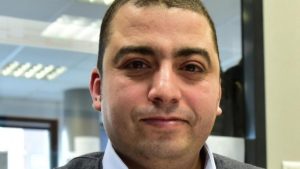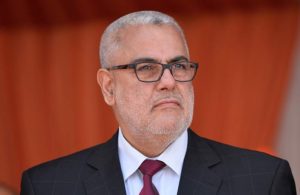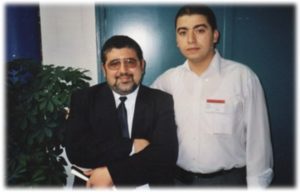 As the saying goes, there is no one more radical than a convert. Mohamed Louizi is a clear example of this: According to his own biography, he began his career as an activist[1] (in 2002) as a member of the UOIF (Union des Organizations Islamiques de France): an organization that is close to the Muslim Brotherhood[2]. Well, he changed his mind. In his adopted country, he is one of the most successful political activists: in writings or on television, he thunders against anyone who, in his perception of reality, supports, encourages, tolerates Islamic fanaticism – starting from an extremist position, of course, which he sometimes assumes sensationally exaggerating.
As the saying goes, there is no one more radical than a convert. Mohamed Louizi is a clear example of this: According to his own biography, he began his career as an activist[1] (in 2002) as a member of the UOIF (Union des Organizations Islamiques de France): an organization that is close to the Muslim Brotherhood[2]. Well, he changed his mind. In his adopted country, he is one of the most successful political activists: in writings or on television, he thunders against anyone who, in his perception of reality, supports, encourages, tolerates Islamic fanaticism – starting from an extremist position, of course, which he sometimes assumes sensationally exaggerating.
When Louizi arrived in Lille in 2002, shortly after graduating from Morocco, he (rightly) sought contacts and found them in the UOIF – the association that brings together all components of the vast galaxy of the Islamic world, including the Muslim Brotherhood. However, after a decade as a passionate activist, the enlightenment comes: Louizi leaves the UOIF in 2012 and becomes one of the main enemies of this organization and an enemy of the Brotherhood and Qatar because, in his eyes, these entities are comparable to the neo-Nazi organization PEGIDA[3] and how PEGIDA, they should be banned. They are (in his opinion[4]) the spearhead of Salafism[5], which (in his opinion) is the main opponent of global peace and the main support for religious terrorism[6]. A thesis to the taste of Marine Le Pen and the French right-wing extremists to justify one of their obsession: the expulsion of Muslims from the European Union.[7]
Mohamed Louizi presented himself on the stage of the French political debate with his book “Pourquoi j’ai quitté les Frères Muslims: Return to Islamic Politics“[8]: his departure from a party (the Muslim Brotherhood), which he allegedly joined at the age of 17 is what he later regretted[9]. This book was the first in a series of numerous publications, the main message of which is that France cannot accept that Muslims are allowed to be politically active in that country[10]. Oddly enough, according to his statements, he should be the first to stop any political activity in the country (France)[11] that welcomed him as a young engineer and gave him the opportunity to establish himself as an electrical engineer, to found his family, and become one of the best-paid ideologues of the France’s political right wing.
Of course, this is only the opinion of the writer of this essay. From an ideological point of view[12], Louizi supports an acceptable thesis that has been an open question even in Christianity for decades, as the birth of Italian Christian Democracy[13] and similar parties across Europe faced two points of view, which are of diametrically opposite optics: it is right to have a secular party that is heavily inspired by religious criteria (like Christian Democracy or the Muslim Brotherhood[14]), or should those who are deeply religious be asked to stay out of politics, as Louizi claims?[15]
Be that as it may, it is right that you change your mind in the course of your life. Louizi has done it several times: his political career did not begin in 1991 at the age of 17 when he enrolled in the Faculty of Science and Technology at Mohammadia University (Morocco), where he graduated in 1999 (only 21 years old[16]), but, as he writes in his book, many years earlier, when he was only 13 years old[17]. He was an activist of the Harakat al Tawhid wal Islah[18] movement – an anti-monarchist party founded by Abdelilah Benkirane, whose aim was to counter King Hassan II’s will to persecute the Muslim extremists, because the King saw them as a threat to his power.[19]
History of the PJD, from extremism to conformism

The founder and head of the PJD, Abdelilah Benkirane
Abdelilah Benkirane was born in 1954 and was a member of the Muslim youth (Chabiba al Islamiya), a radical underground movement that was founded in 1969. The movement’s leader, Abdelkrim Mouti, a school inspector, was heavily influenced by the writings of the leader of the Islamic Brotherhood Sayyid Qutb[20], who had recently been sentenced to death (1966) and hanged in Egypt[21]. The original goal of the group was to influence a change in the universities that were then under the rule of the left and to which Chabiba al Islamiya had a radical vision of the importance of religiosity in science[22]. The monarchy’s (including the Moroccan) fear of young, politically active Muslims began with some attacks by this university movement against trade unionists in 1975, all the more after the Iranian revolution that brought Ayatollahs to power in 1979 and transformed Persia into a theocracy.[23]
In the early 1980s, Morocco changed its strategy and accompanied the oppression of the fiercest activists with the co-optation of the moderates – at that point Benkirane broke away from young Muslims and, together with Louizi and other militants, “married” the monarchy and founded the MUR (Harakat al Tawhid wal Islah – Movement for Unity and Reform[24]), knowing that the King would support his project: In the meantime, a new radical clerical movement was born (called Al ‘Adl wal Ihsane), so that both Benkirane, as well as King Muhammad VI, had great interest in preventing young radicals from getting into a revolutionary formation.[25]
The 1994[26] MUR political manifesto entitled “Al-Mithaq”, which is peppered with quotes from the Koran, contains a reference to Muslim morality and a rejection of corruption in public administration, the monarchy and the army, assessed as the cause of a deep social and economic crisis. Benkirane, who already has an agreement with the King, must try to reconcile the dreams and aspirations of the upper middle class, of all the intellectuals from Pan-Arabism to Socialism, but also the religiosity of the Muslim Brotherhood, as well as the extreme nationalism that was growing in these years. The neighboring Algeria was bleeding, Morocco was ready for a reform of the monarchy, which MUR never questions as leader of the country[27]. In reality there are two aces up your sleeve: the public alliance with the Muslim Brotherhood, which means money and organizational aid, and the more secret one with King Mohammed VI.[28]
The election failed after five years, but was politically successful: Benkirane and King Mohammed are now clearly allies. Louizi is part of a pro-monarchist party that has turned its back on the Islamic Brotherhood since 1999: In fact, Louizi follows Benkirane in the formation of a new political party, the PJD (Justice and Development Party), which is still in power to this day[29]. In the years between Louizi’s graduation and his moving to France, the PJD will be an active part of the country’s government[30], thanks in part to its moderation and to the fact that its connection to a monarch with a more modern vision of Morocco (and its commitment to religious radicalization) bring international reputation to both sides[31].
A monarchist agent in Lille

Lille, 2002: Mohamed Louizi hugs UOIF Secretary General Fouad Alaoui
This means that on the day he moved to France (in 2002) and became an executive member of the UOIF[32] office in Lille, Louizi had turned his back on the Muslim Brotherhood since almost three years. Not because he chose to end his political career, as he says, but because of the opposite, as the head of his movement, Abdelilah Benkirane, demanded.[33]
The UOIF, which has the task of bringing all Muslims together regardless of political and theological divisions, will be forced to end all ties to the Muslim Brotherhood[34] in 2017 in order not to endanger their survival in France, and its name in “Musulmans de France” (MdF)[35] to change. An organization that is now an established member of the UOIE (Federation of Islamic Organizations in Europe[36]), which belongs to a cartel that is financially and politically supported by Saudi Arabia and the United Arab Emirates[37]. So for Louizi: Mission accomplished.
Obviously, this result is not enough for the Moroccan pro-monarchist activist or for his followers in the Persian Gulf. There is a war against Qatar, which is considered the most dangerous ally of the Islamic Brotherhood, and against those who, according to Louizi, want to wipe out feudal monarchies from the Middle East in the name of Islam. He becomes a consultant to non-fiction authors who come closest to his vision. Mohamed Louizi is one of the main sources of the book by Ian Hamel, a member of the team of journalists paid for by an Egyptian Pro-Saudi extremist, Abdelraheem Ali[38]. Based on the content of this book, called “Tariq Ramadan”[39], Ian Hamel is under criminal investigation in a Swiss court on suspicion of falsification of documents.[40]
Ian Hamel’s essay sells little and is not well received. Abdelraheem Ali convinced two French journalists, Christian Chesnot and Georges Malbrunot, to write a more exclusive book: “Qatar Papers“, which contains an evaluation of several accountancy documents stolen from State Ministries and NGOs from Qatar.[41] Louizi is one of the main sources of the book[42], especially with his gossip about the Islamic center of Villeneuve d’Ascq and the Averroès high school in Lille. He is also one of the main assistants of Jérôme Sesquin’s documentary, which accompanied the production of “Qatar Papers“.
The fact is that Mohamed Louizi, who also claimed that Qatar launched and supported the “Gilets Jaunes” movement, has already been convicted of defamation by the Lille court for lying publicly about a local businessman, Soufiane Iquioussen: an honored young man who, thanks to the success of his auto repair shop and his solidarity activities, was selected with the Regional Award for Best Young Manager of 2016. During the trial, there were only two newspapers that defended Louizi publicly: Le Figaro (Georges Malbrunot) and Le Point (Ian Hamel).
Mohamed Louizi also accused Emmanuel Macron of treason and claimed that his political party had been infiltrated by the Muslim Brotherhood. Louizi is also the man who claims that Macron and the Qatar government are funding terrorism in Syria. Because of these allegations, Rachid El-Kheng, a personal assistant to President Macron, sued Louizi for defamation. In the “European Report on Islamophobia 2018“, a manual that is paid for with financial support from the European Union, Mohamed Louizi is repeatedly mentioned as an instigator of hatred of Islam.
A hatred that fortunately does not spoil the Moroccan activist’s health, but on the contrary allows him to make good money and have the satisfaction of attending conferences, talk shows and political seminars.
[1] https://www.amazon.com/Pourquoi-jai-quitt%C3%A9-fr%C3%A8res-musulmans/dp/2841868184
[2] https://www.marianne.net/societe/un-collectif-publie-une-cartographie-de-la-galaxie-des-freres-musulmans-en-france
[3] Founded in Dresden (Germany) in October 2014, PEGIDA Patriotic Europeans Against the Islamisation of the Occident (Patriotische Europäer gegen die Islamisierung des Abendlandes), is a Pan-European, Islam-Phobic, extreme right political movement. Pegida believes that Germany is being increasingly Islamicized and defines itself in opposition to the danger of destruction of the Arian genetics, tradition, religion and culture because of the Muslims. Pegida wants to curb immigration; it accuses authorities of failure to enforce immigration laws. In 2015, Lutz Bachmann, the founder of Pegida, resigned from the movement after reportedly posing as Adolf Hitler and making racist statements on Facebook. He was later reinstated – see Fabian Virchow, “PEGIDA: Understanding the Emergence and Essence of Nativist Protest in Dresden“, Journal of Intercultural Studies, volume 37 / 2016, Taylor and Francis Ltd., London 2020; https://www.spiegel.de/international/germany/origins-of-german-anti-muslim-group-pegida-a-1012522 ; https://www.ssoar.info/ssoar/bitstream/handle/document/55598/ssoar-politicquarterly-2015-4-dostal-The_Pegida_Movement_and_German.pdf?sequence=1 ; http://blogs.colgate.edu/keck/2015/03/pegida-in-germany.html
[4] https://huffpost50.rssing.com/chan-24823712/all_p422.html
[5] This fact, in our opinion, has been the reason why Christian Chesnot and Georges Malbrunot, after the abduction of 2004, gave the blame of the kidnapping to a Salafist group and not to the Sadrism Army, which has been the probable mind behind that abduction – see Chapter 1.2 of this Main Report
[6] https://www.lefigaro.fr/vox/societe/2016/02/05/31003-20160205ARTFIG00415-uoif-freres-musulmans-salafisme-le-dessous-des-cartes.php
[7] https://www.nouvelobs.com/presidentielle-2017/20170504.OBS8965/freres-musulmans-conferences-polemiques-10-choses-a-savoir-sur-l-uoif.html
[8] https://www.michalon.fr/index.asp?navig=catalogue&obj=livre&no=500568&razSqlClone=1
[9] https://www.youtube.com/watch?time_continue=4&v=JQwduGLmeU8&feature=emb_title
[10] His last post on his blog repeats his paranoid assertions: if there are local lists, where Muslims are candidates for some Municipal election, this is a real and immediate danger for the ethnic survival of the French population, even if there are only 10 in a row of 20765 allowed local lists – see http://mlouizi.unblog.fr/2020/03/10/les-municipales-a-lheure-de-lislam-politique-a-roubaistan/#more-2016
[11] http://mlouizi.unblog.fr/perso/
[12] https://www.avvenire.it/agora/pagine/sturzo-politica-atto-damore ; https://www.vaticannews.va/it/mondo/news/2019-04/100-anni-appello-don-sturzo-intervista-salvatore-martinez.html ; https://www.avvenire.it/opinioni/pagine/fede-e-impegno-in-politica-i-cristiani-che-fanno-litalia ; https://www.agensir.it/quotidiano/2019/2/8/cattolici-e-politica-mons-ardura-non-abbiamo-bisogno-di-politici-cristiani-ma-di-cristiani-impegnati-in-politica/ ; http://www.fter.org/go/images/documenti/pdf/MarioChiaro_Confronti_2010.doc.pdf
[13] https://www.lintellettualedissidente.it/controcultura/storia/le-fondamenta-sociali-della-democrazia-cristiana/
[14] https://www.hudson.org/research/9857-the-crisis-of-the-arab-brotherhood
[15] Mohamed Louizi, “Plaidoyer pour un Islam apolitique”, Michelon, Paris 2017
[16] http://mlouizi.unblog.fr/perso/
[17] https://www.amazon.it/Pourquoi-jai-quitt%C3%A9-fr%C3%A8res-musulmans/dp/2841868184
[18] http://mlouizi.unblog.fr/perso/
[19] “Born in 1954, Abdelilah Benkirane was a member of Muslim Youths (Chabiba al Islamiya), a radical clandestine movement established in 1969. The movement’s leader, Abdelkrim Mouti, an inspector of primary education, was influenced by the writings of radical Egyptian Islamist Sayyid Qutb. The group’s original target was universities, which were then under the sway of secular leftists. The PJD’s main objective was to liberate society from jahiliya, which refers to ignorance of divine guidance in pre-Islamic Arabia. The monarchy’s tolerance of Muslim Youths began to wane after the group’s assassination of a leftist labour leader in 1975 and Iran’s Islamic revolution in 1979. In the late 1970s and early 1980s, the government launched a dual strategy of repression and co-optation of Islamist militants. Benkirane broke with the banned Muslim Youths in 1980; he then took small steps to reassure the security apparatus in exchange for help integrating loose Islamist groups into the legal associations. In the 1990s, two developments aided Benkirane’s project. First, a civil war consumed neighbouring Algeria after the military cancelled elections that Islamists were poised to sweep in 1992. Second, a radical new clerical movement was highly critical of Morocco’s participation with U.S. forces in the 1990–91 Gulf War to liberate Kuwait after Iraq’s invasion. In 1992, Benkirane was allowed to establish Reform and Renewal (al Islah wa Tajdid), a group that conspicuously dropped the name of Islam even though it was an Islamic association. It changed its name to the Movement of Unity and Reform (Harakat al Tawhid wal Islah, or MUR) in 1996, after three regional groups joined in. The new movement provided the social and religious backbone of the future political party”, the PJD – see https://www.wilsoncenter.org/article/morocco-the-kings-islamists
[20] https://www.wilsoncenter.org/article/morocco-the-kings-islamists
[21] https://www.britannica.com/biography/Sayyid-Qutb
[22] https://www.wilsoncenter.org/article/morocco-the-kings-islamists
[23] Abdolmohammad Kazemipur, “Religious Life Under Theocracy: The Case of Iran”, Journal for the Scientific Study of Religion, Volume 42, pages 347-361
[24] https://www.wilsoncenter.org/article/morocco-the-kings-islamists
[25] https://www.hudson.org/research/12286-islamism-and-the-state-in-morocco
[26] https://www.hudson.org/research/12286-islamism-and-the-state-in-morocco
[27] https://www.wilsoncenter.org/article/morocco-the-kings-islamists
[28] Holger Albrecht, Eva Wegner, “Dictators and Islamists: A comparative perspective on Egypt and Morocco”, ECPR European Consortium for Political Research, Colchester 2005, pages 5-13 – see https://ecpr.eu/Filestore/PaperProposal/70ceab3e-76b9-4d5a-8f31-41b989333a68.pdf
[29] http://news.bbc.co.uk/2/hi/africa/402712.stm
[30] https://www.theguardian.com/world/2010/dec/06/wikileaks-cables-morocco-royals-corruption
[31] https://web.archive.org/web/20110525003606/http://moroccansforchange.com/2011/03/09/king-mohamed-vi-speech-3911-full-text-feb20-khitab/ ; https://www.bbc.com/news/world-africa-13964550
[32] http://www.vitainternational.media/en/article/2015/11/27/why-i-quit-the-muslim-brotherhood/82/ ; https://www.atlantico.fr/decryptage/2552387/mohamed-louizi-raconte-pourquoi-il-a-quitte-les-freres-musulmans-et-explique-le-role-de-la-republique-et-la-laicite-dans-son-cheminement-editions-michalon
[33] Abdelilah Benkirane: “I say to young talents, get involved in politics. If you are graduates of HEC Paris, you are successful this is very good for you. You are comfortable in your cabin and it is very comfortable. But if the Morocco boat sinks, you will sink with it. The brains of Morocco must get involved in politics. The brains must integrate the Moroccan administration and the political life otherwise we will always be led by ignorant people and rots”, see https://www.youtube.com/watch?v=VtEC3iu7aSc
[34] http://mlouizi.unblog.fr/perso/
[35] https://www.la-croix.com/France/Changement-pour-UOIF-desormais-appelee-Musulmans-France-2017-04-15-1300839890
[36] https://euobserver.com/news/25444
[37] Fabrice Maulion, “L’organisation des Frères Musulmans : évolution historique, cartographie et éléments d’une typologie”, Université Panthéon-Assas-Paris II, DRMC Département de Recherche sur les Menaces Criminelles Contemporaines, Paris 2004, pages 43-44 and pages 47
[38] See Chapter 6.2.6, 6.2.9, 6.2.10, 6.2.11 and 6.2.12 of this Main Report;
[39] https://books.google.it/books?id=EmPIDwAAQBAJ&pg=PR4-IA3&lpg=PR4-IA3&dq=sesquin+louizi&source=bl&ots=0NV_ZdrQr7&sig=ACfU3U3Gho8Du7LXYu1eieUY-9eTaIXERw&hl=it&sa=X&ved=2ahUKEwiKyb-RhZ_qAhWowqYKHfU7CBMQ6AEwAXoECAoQAQ#v=onepage&q=sesquin%20louizi&f=false
[40] https://www.reveilcitoyenmedia.com/post/ian-hamel-fait-face-%C3%A0-la-justice-helv%C3%A9tique-pour-avoir-diffam%C3%A9-et-calomni%C3%A9-tariq-ramadan
[41] http://www.michel-lafon.fr/livre/2233-QATAR_PAPERS.html
[42] Christian Chesnot, Georges Malbrunot, “Qatar Papers, il libro nero dell’Islam”, versione italiana, Rizzoli, Milano 2019, page 36, pages 100-101, pages 112-113, passim
Leave a Reply